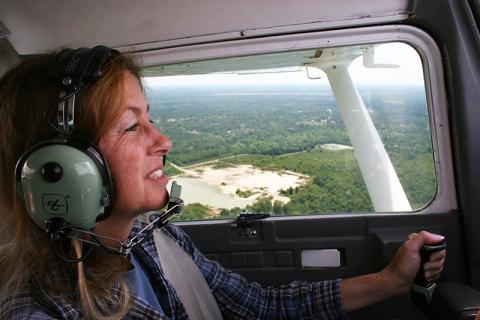Go spy a kite: a good quarantine hobby, expert says
While everyone is still isolating, quarantining or keeping socially distant, there might be enough time to fit in a new hobby, one with a Tulane connection: raptor reporting.
“Louisiana has a very rich avifauna ... We can have very dense populations of birds, and quite a diversity of them.”
Jennifer Coulson
Jennifer Coulson, PhD, of the Department of Ecology and Evolutionary Biology in the School of Science and Engineering, and current president of the Orleans Audubon Society, studies raptors — birds of prey — in the Gulf South. Part of her raptor study is to educate Louisiana residents about the bountiful birds of prey and encourage people to be on the lookout.
“Louisiana has a very rich avifauna,” Coulson said. “It’s mainly because the land is so rich here. We’re receiving nutrients from the whole country, here in the delta, especially historically, when the Mississippi River used to overflow its banks. It’s a warm climate with a long growing season. We can have very dense populations of birds, and quite a diversity of them.”
Even so, Coulson studies those raptors whose populations aren’t thriving, such as the swallow-tailed kite, which is notable for its 10,000-mile migration between the southern United States and southern Brazil. But its numbers have declined significantly over the last century. Its migration path has actually shrunk from Minnesota as its northern border; now the swallow-tailed kite might migrate only as far north as the Carolinas.
Over time, habitat loss and predator control may have contributed to their decline. Although today the kite is a protected species, continued threats to its existence include habitat loss and degradation, an increase in predators on the breeding grounds, pesticide poisoning and persecution (shooting). A recent review of Coulson’s study subjects showed that three of four tagged birds died within six months while in Central and South America.
“It’s a real challenge to try to piece together what’s going on with a bird that has a global range like the swallow-tailed kite,” she said. “These data show that they seem to be losing ground. If you lose that many on migration, it can really be difficult for the population to offset those deaths during the breeding season.”
Coulson, who earned a PhD from Tulane in 2006, studied with Professor Tom Sherry of the Department of Ecology and Evolutionary Biology, who was her major professor then and today serves as an adviser of her kite study. Coulson has also worked with Senior Professor of Practice Donata Henry, and since Tulane’s transition to online learning has delivered some virtual lectures to Henry’s ornithology students.
Coulson has published studies on the predators and parasites of the swallow-tailed kite, also serves as co-author on a study of hybridization of hawks in California, and will be contributing to the American Kestrel Genoscape Project.
Coulson said it’s not all bad news for the swallow-tailed kite, though. Birdwatchers often turn into “citizen scientists,” who eagerly report sightings and nest locations to her.
“Most people are really excited,” especially people who learn kites are nesting on their property. “They're happy to know the birds are there. And the fact that the birds are there means that they have some really good forest that has been taken good care of.”
To access training materials for citizen scientists who wish to help kites and other native birds, click here. To report a kite nest or sighting, click here.

